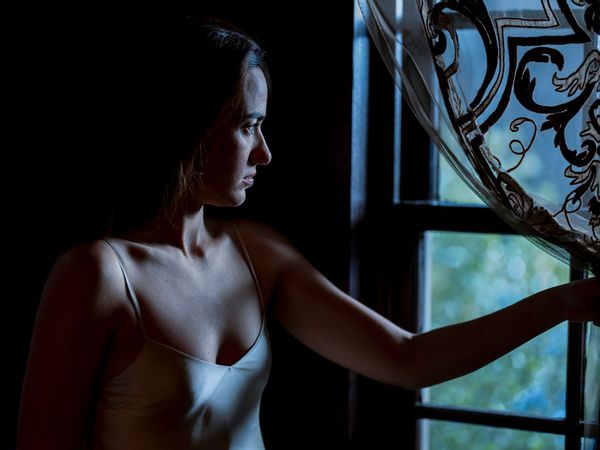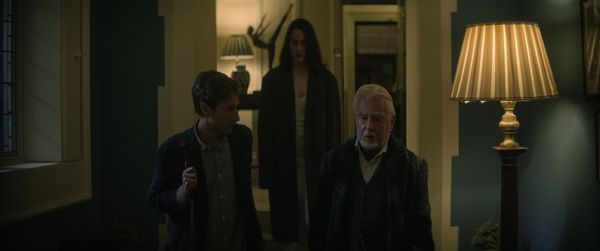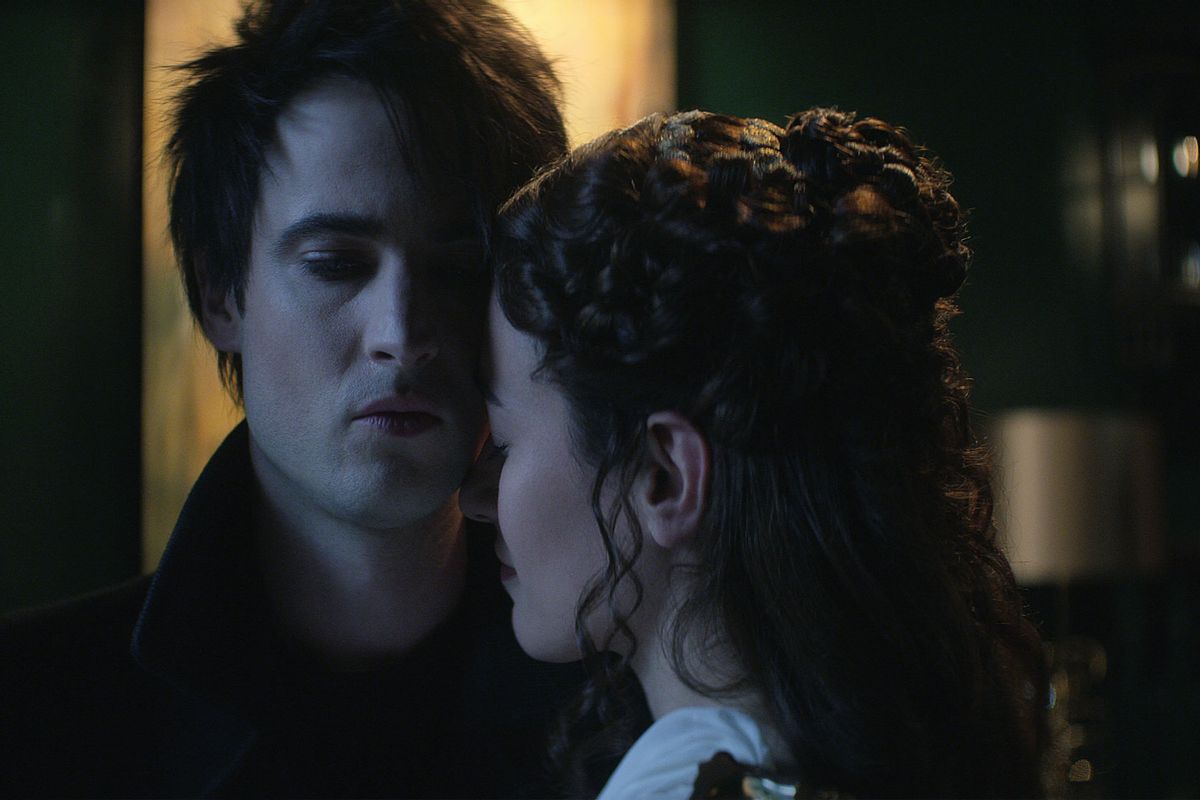"Calliope," the second story in the 11th episode of "The Sandman," takes us back to August 2020 and a reception for novelist Richard Madoc's acclaimed sophomore effort ". . . And My Love, She Gave Me Light."
Madoc breezily retrieves a cocktail and eavesdrops on the guests' appraisals of his latest, ranging from envious to gushing. Then he sits down on his couch and hands the drink to a besotted woman.
"I was saying how much I loved your characterization of Eileen," she tells him. "There aren't enough strong female characters in fiction, not even fiction written by women."
"I agree," Richard says. "And I know it's fashionable at the moment to say that only women can write authentically about the female experience, but uh . . . well, I do tend to regard myself as a feminist writer."
"And where does that voice come from in you, the female voice?" his guest asks.
He replies, "From the women in my life."
It's fun to imagine Catherine Smyth-McMullen, the episode's writer, concocting this exchange while wearing a wry grin, spurred on by knowing what type of man announces himself as a feminist unbidden, especially in 2020. By then we were well into the post-#MeToo era and understood the term to be the verbal equivalent of Rohypnol, a little something con men slip into conversation hoping of breaching a woman's defenses.
Then, after he treats her like trash, maybe she'll question her judgment or, worse, her worthiness to call herself a feminist. If he has power, as several infamous entertainers did (and still do) he can destroy her career. And supposedly wiser people, mainly men, will simply tell her she should have known better.
All of this informs Smyth-McMullen's take on "Calliope," a much-changed version since it was first published in 1990 as part of a collection of "Sandman" issues titled "Dream Country." (That collection also includes "A Dream of a Thousand Cats," an animated adaptation that opens the episode.)
In Netflix's take, Richard Madoc (Arthur Darvill) authors a blockbuster (and changes his nom de plume to the highly pretentious Ric) by mimicking the female gaze. Like the guest at his reception, his women readers adore the way he gets them.
 Melissanthu Mahut as Calliope in "The Sandman" (Courtesy Of Netflix)
Melissanthu Mahut as Calliope in "The Sandman" (Courtesy Of Netflix)
None of them know that literary voice belongs to a mythological Muse who he has imprisoned in his home, and from whom he compels divine inspiration by abusing her, including rape.
This "Sandman" story transforms from merely a sexist savior's tale into a story of mass violation.
Neil Gaiman originally wrote Calliope as a device enabling Dream to play the hero by punishing a crime no good man would countenance. Dream and Calliope used to be married and had a son, Orpheus, whose tragic death inspired another myth on top of precipitating their breakup.
His choice to save her demonstrates one way that his imprisonment makes him more understanding than he used to be. This lent a flattened clarity to his role and Calliope's, and to Richard's, who has no qualms about assaulting Calliope as long as it gets him what he wants.
None of this would play well in any modern adaptation of the story, regardless of who took on the task. But it absolutely matters that Gaiman tapped Smyth-McMullen to write this updated version and Louise Hooper to direct it. Through them, this "Sandman" story transforms from merely a sexist savior's tale into a story of violation on a massive scale.
Richard is introduced as a reasonably decent man who degrades his soul, and a goddess, out of desperation: he's long overdue to deliver his second novel to his publisher and stalled out by writer's block.
Still, he recognizes the deal that brings him Calliope (played by Melissanthu Mahut) is criminally exploitative. Richard trades a bezoar made from a clump of hair to obtain Calliope from acclaimed author Erasmus Fry (Derek Jacobi), who captured Calliope in 1927.
Fry is at the end of his life and has stripped all the wealth and fame he wants from Calliope's powers, and hands her over as if she were a piece of used-up livestock. "They say one ought to woo her kind, but I must say I found force most efficacious," Fry says before adding, as if to soothe Richard, "Oh don't be fooled – she's not human. She's thousands of years old. She was created for this. This is her purpose: to inspire men like us."
Nevertheless, Richard tries the kinder way first, showering Calliope with flowers, chocolates, perfume, and other luxuries to wrest the smallest thread of an idea from her. But she insists she won't comply until he frees her and then offer supplication. He still refuses, then attempts his version of a prayer: "I am drowning, Calliope. Please. I am begging you."
"Ask me again when I am free," she replies gently.
Every written and visual update to the story reflects the perspective of women who have their version of a Richard Madoc encounter to tell, or many, whether experienced first or second-hand, whether physical or emotional.
Casting Arthur Darvill as Richard further augments the horror of the character's crimes: Darvill is best known for playing the "Doctor Who" companion Rory Williams, the man who loved his fiancée enough to stand guard over her for 2,000 years. Rory is the ideal man: devoted, smart, courageous and loving.
Richard resembles a certain TV series creator-turned-director who built his career on a reputation for writing supernaturally strong women.
Richard, on the other hand, stares at a blank computer screen after this painful talk before coming to a decision. Hooper keeps the camera trained on the empty digital page as we hear Richard knock on Calliope's door and say her name . . . before the scene cuts to black and silence. When the story resumes, "Ric" is tapping his computer's keyboard with wild satisfaction. His shirt is unbuttoned past his sternum and on his cheek is a fresh, still-bloody scratch.
Whether intentional or not on the part of Smyth-McMullen, Richard resembles a certain TV series creator-turned-movie-director who built his career on a reputation for writing supernaturally strong women.
You may recognize the outline of his features in Richard's party banter or a subsequent phone conversation with his agent where he demands that his film production's cast and crew be made up of at least 50% women and people of color. Then he tells him to be sure to publicize that, because he wants his fans to know what a fantastic guy he is. Especially women.
He also has a lot in common with the comic who made a public show of his allyship with female comedians, only to be outed for his habit of forcing other women to watch him masturbate when he got them alone. Really, though, Richard could be any number of famous men who crow about their feminism in magazine profiles and red carpet interviews while abusing women in their private lives.
Finding out the truth of who these men are constitutes a bone-deep betrayal for some fans who believed in the false image they cultivated. This is especially true of the ones who, as Richard tells Calliope, designed their art to inspire people – women, specifically – instead of simply entertaining the public.
 Arthur Darvill as Richard Madoc, Melissanthu Mahut as Calliope and Derek Jacobi as Erasmus Fry in "The Sandman" (Courtesy Of Netflix)
Arthur Darvill as Richard Madoc, Melissanthu Mahut as Calliope and Derek Jacobi as Erasmus Fry in "The Sandman" (Courtesy Of Netflix)
"Writers are liars, my dear," Fry pompously tells Calliope after she reminds him that he agreed to free her at the end of his life. Richard repeats it to her later, when he's long past the point of needing her to survive and has simply decided he wants more of everything – fame, wealth, and worship.
Smyth-McMullen reshapes Calliope into a goddess who was trapped but not resigned to her exploitation. She takes every step possible to free herself from Richard until, finally, Dream (Tom Sturridge) answers her call.
Then "Calliope" turns into a vengeance story: Dream castigates Richard for holding Calliope captive and orders him to free her. He whines that he needs her. "Hold your tongue," Dream growls. "She has been held captive for more than 60 years. Demeaned. Abused. Defiled. And you will not set her free because you need ideas?"
In response, Dream gives Richard Madoc what he wants, and it ruins him even after he frees the imprisoned Muse.
A few social media posts questioned whether a story centered on a woman's violent sexual exploitation should be featured in "The Sandman" at all, regardless of its changed context.
Want a daily wrap-up of all the news and commentary Salon has to offer? Subscribe to our morning newsletter, Crash Course.
But this episode is everything that "Games of Thrones" – along with every other show that treats rape as a narrative device designed to stir up a man's rage or add complexity to a woman's story – is not. Hooper doesn't show her physical suffering. She doesn't need to. No director ever did. If we appreciate Calliope's fortitude, rage and, ultimately, her grace in the aftermath of her ghastly confinement, it is because of her dignified righteously angry way she carries herself when Richard isn't in her presence. Mahut and her writer never let us forget that she's a living goddess, not a possession.
It's also clear that Dream respond to Calliope's entreaty from a place of empathy, which is an unfamiliar concept for an Endless. But none of his siblings spent decades in a box, having been swindled by a cheap man whose talent level might be described at best, as middling. Neither did they come to his aid. He knows Calliope's plight because he lived it. Helping someone he used to love makes him better than those who failed him.
In this way, "Calliope" indicts men like Richard Madoc while granting benediction to everyone who feels swindled by those like him, figures who owe whatever image burnishing they gain to pilfered power. Some writers, comics, and other artists, may indeed be liars. But "The Sandman" defeats this trickery with an inspired view of a woman's truth . . . even if that tale began as a flawed product of a man's imagination.
All episodes of "The Sandman" are streaming on Netflix.
Read more
about Neil Gaiman's work



Shares